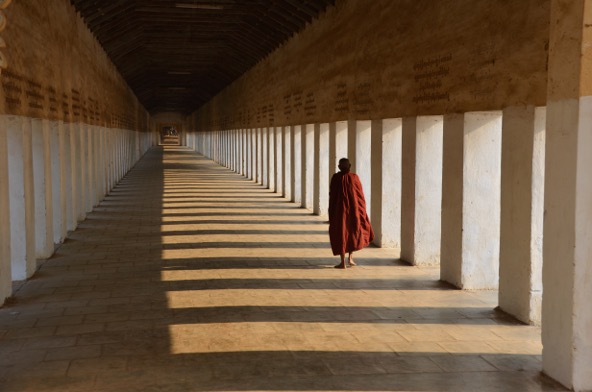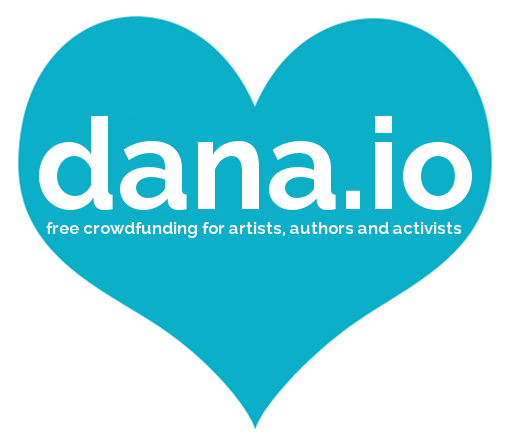THE DISTRIBUTION BULLETIN ISSUE #22
27/May/2014
CROWDFUNDING FOR FREE
The unprecedented crowdfunding platform dana.io launches today. Filmmakers, artists, and activists around the world can use it for free. Unlike other platforms, dana.io does not take a percentage of the money raised.

This new model is based on the ancient practice of unconditional giving known as “dana,” in the Buddhist tradition. Just as Buddhist nuns and monks throughout history have been sustained by the dana offered to them by supporters, the dana.io crowdfunding platform will be freely offered for the funding of projects. The plan is that users, inspired by the concept that catalyzed the funding of their projects, will in turn voluntarily gift some of the money they raise to dana.io.
The director of dana.io, Alan Clements, shared his vision with me in a series of exclusive interviews. His passionate belief in the power of gifting grew out of his experience living as a Buddhist monk in Burma during the late 1970s and 1980s, where everything was offered openly and freely on dana: food, medicine, shelter, and the teachings themselves. After being forced out by the dictatorship, Alan became an investigative journalist, a human rights campaigner, and a media activist. After Aung San Suu Kyi (Burma's Nobel Peace laureate and leader of her country's nonviolent revolution) was released from detention, Alan collaborated with her on a series of underground conversations, which became the book, The Voice of Hope.
Here are the key features of dana.io:
Alan and his team are committed to engaging directly with those who want to use the platform. They are having detailed conversations with applicants and helping them develop their campaigns. They have created a substantial guide to crowdfunding for their users. They are also developing a pool of experts (many of them will volunteer their services), whom users can work with to design and implement their campaigns.
Dana.io welcomes a great diversity of projects. The team has already considered 150 applications. While anyone from anywhere in the world can apply to use the platform, as the volume of applicants increases, it is expected that the process will become more selective.
The initial group of projects, which will appear on the site over the next few weeks, includes:
Director Alan Clements is excited to be collaborating with “visionary artists, cultural architects, and peaceful revolutionaries.” He is committed to facilitating “conscious crowdfunding.”
Dana.io is a radical experiment. By not taking a percentage of monies raised or charging fees, the platform is working without the standard crowd-funding net. It is testing the possibility of crowdfunding a crowdfunding platform.

The development and launch of dana.io were funded by a generous gift, which will cover costs through August. By then it will be clear whether there is sufficient support from users of the platform and others who find the model compelling.
Achieving sustainability is just an interim step. All contributions beyond what is needed for day-to-day operations will be reinvested to expand services and give back to new campaigns. There are plans for: an Incubator; Crowdfunding U.; and ambassador, affiliate, consultation, and partnership programs. Also in the works is a Dana Pool funded by user contributions, which will provide additional funding to projects on the platform.
The initial goal is to lower the threshold of entry to crowdfunding. The platform is doing this by not charging a fee or percentage, providing rich information resources, and giving users access to staff and outside experts who can assist them. Another goal is to create a “nexus for skills-sharing and collaboration, a hub for the co-creation of bold visions.”
Alan would also like dana.io to explore “micro-crowdfunding” following the example of “micro-lending.” He wants to develop a method that will work for people with very limited resources who have global access for the first time through their cellphones.
The site will make use of what Alan calls “crowdgifting.” For the first 45 days, all visitors to dana.io will be able to download for free his book, A Future to Believe In: 108 Reflections on the Art and Activism of Freedom. The platform embodies the principles in the book and giving it away is perfect for the launch.

Dana.io has exciting potential. Like other platforms, it may enable many campaigns to attract critical support. But dana.io is uniquely positioned to take unconditional giving to a new level outside Buddhist practice. If a crowdfunding platform built on dana succeeds, it could catalyze the application of dana to many other areas of life. This gamble on generosity could have revolutionary results.
The unprecedented crowdfunding platform dana.io launches today. Filmmakers, artists, and activists around the world can use it for free. Unlike other platforms, dana.io does not take a percentage of the money raised.

This new model is based on the ancient practice of unconditional giving known as “dana,” in the Buddhist tradition. Just as Buddhist nuns and monks throughout history have been sustained by the dana offered to them by supporters, the dana.io crowdfunding platform will be freely offered for the funding of projects. The plan is that users, inspired by the concept that catalyzed the funding of their projects, will in turn voluntarily gift some of the money they raise to dana.io.
The director of dana.io, Alan Clements, shared his vision with me in a series of exclusive interviews. His passionate belief in the power of gifting grew out of his experience living as a Buddhist monk in Burma during the late 1970s and 1980s, where everything was offered openly and freely on dana: food, medicine, shelter, and the teachings themselves. After being forced out by the dictatorship, Alan became an investigative journalist, a human rights campaigner, and a media activist. After Aung San Suu Kyi (Burma's Nobel Peace laureate and leader of her country's nonviolent revolution) was released from detention, Alan collaborated with her on a series of underground conversations, which became the book, The Voice of Hope.
Here are the key features of dana.io:
- Contributions go directly to users through their payment processors
- Users choose their payment processor (PayPal will be available at launch and will be followed by Stripe; users may soon also be able to receive contributions by check and wire transfers directly into their bank accounts)
- Users receive contributions as quickly as their payment processor completes the transfer (the platform has no control of donations; no donations are held until a campaign ends)
- Users receive all of their contributions minus the payment processor’s fee (PayPal 2.9% plus 30 cents; Stripe 2.4% plus 34 cents - these are the basic fees and don’t include currency conversion charges)
- Users receive whatever they raise regardless of whether they meet their fundraising goal
- Users have complete control over their campaigns, including the ability to change their goals mid-campaign
Alan and his team are committed to engaging directly with those who want to use the platform. They are having detailed conversations with applicants and helping them develop their campaigns. They have created a substantial guide to crowdfunding for their users. They are also developing a pool of experts (many of them will volunteer their services), whom users can work with to design and implement their campaigns.
Dana.io welcomes a great diversity of projects. The team has already considered 150 applications. While anyone from anywhere in the world can apply to use the platform, as the volume of applicants increases, it is expected that the process will become more selective.
The initial group of projects, which will appear on the site over the next few weeks, includes:
- Gift: Robin McKenna’s feature documentary and cross-media project. Inspired by The Gift, Louis Hyde’s groundbreaking book, the project will chronicle gift-based cultures and ask whether life should be about getting or giving.
- Out of History: The Politics of Sex: Harry Sutherland’s transmedia presentation of LGBT history. It will take viewers from the invention of the word Homosexuality in 1869 to the Stonewall Rebellion 100 years later.
- The Corporation Film’s Get Up Off The Couch! Campaign: Kat Dodds and Mark Achbar’s campaign to launch a shorter, downloadable, and affordable version of The Corporation with an unlimited license for school and community screenings.
- Citizen Planet: The Cybernetic Global Rising: Oliver Hockenhull’s documentary essay, e-book, and net portal designed to explore aspirations of utopia and project them into the future. It’s the story of humanity’s unrequited love affair with the idea of one world, one life.
- This Kind of Love: Jeanne Hallacy’s documentary tells the story of Burma’s political transition through the homecoming of one activist who is the first openly gay civil society leader in the country.
Director Alan Clements is excited to be collaborating with “visionary artists, cultural architects, and peaceful revolutionaries.” He is committed to facilitating “conscious crowdfunding.”
Dana.io is a radical experiment. By not taking a percentage of monies raised or charging fees, the platform is working without the standard crowd-funding net. It is testing the possibility of crowdfunding a crowdfunding platform.

The development and launch of dana.io were funded by a generous gift, which will cover costs through August. By then it will be clear whether there is sufficient support from users of the platform and others who find the model compelling.
Achieving sustainability is just an interim step. All contributions beyond what is needed for day-to-day operations will be reinvested to expand services and give back to new campaigns. There are plans for: an Incubator; Crowdfunding U.; and ambassador, affiliate, consultation, and partnership programs. Also in the works is a Dana Pool funded by user contributions, which will provide additional funding to projects on the platform.
The initial goal is to lower the threshold of entry to crowdfunding. The platform is doing this by not charging a fee or percentage, providing rich information resources, and giving users access to staff and outside experts who can assist them. Another goal is to create a “nexus for skills-sharing and collaboration, a hub for the co-creation of bold visions.”
Alan would also like dana.io to explore “micro-crowdfunding” following the example of “micro-lending.” He wants to develop a method that will work for people with very limited resources who have global access for the first time through their cellphones.
The site will make use of what Alan calls “crowdgifting.” For the first 45 days, all visitors to dana.io will be able to download for free his book, A Future to Believe In: 108 Reflections on the Art and Activism of Freedom. The platform embodies the principles in the book and giving it away is perfect for the launch.

Dana.io has exciting potential. Like other platforms, it may enable many campaigns to attract critical support. But dana.io is uniquely positioned to take unconditional giving to a new level outside Buddhist practice. If a crowdfunding platform built on dana succeeds, it could catalyze the application of dana to many other areas of life. This gamble on generosity could have revolutionary results.